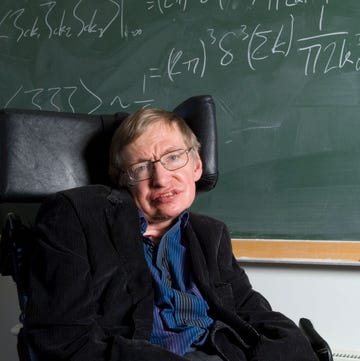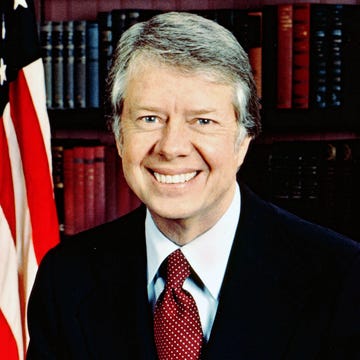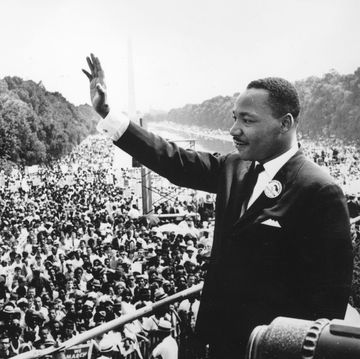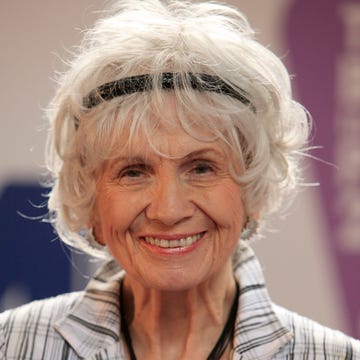(1928-2016)
Who Was Elie Wiesel?
Elie Wiesel is a Nobel Peace Laureate (1986) who was honored for his writing and work done on behalf of Holocaust survivors. He was born in Romania and went to college for Jewish religious studies before he and his family were, like other Jews, forced into Auschwitz, a Nazi concentration camp. Wiesel survived, and later wrote the internationally acclaimed memoir Night. The author of many other books, he became an activist, orator, and teacher, speaking out against persecution and injustice across the globe. Wiesel died on July 2, 2016 at the age of 87.
Family and Early Life
Born Eliezer Wiesel on September 30, 1928, in Sighet, Transylvania, which is now Romania, to Shlomo and Sarah Wiesel. Wiesel had three sisters and pursued religious studies at a nearby yeshiva, or Jewish religious school. His grandfather and mother were believers, while his father was more culturally Jewish.
At home, the Wiesel family, like the Jewish families around them, primarily spoke Yiddish, but they also communicated in German, Hungarian, and Romanian. Wiesel’s maternal grandfather was Hasidic, and his mother was also religious. She encouraged him to read the Torah, while his father was more of a humanistic thinker, and encouraged him to read non-religious literature. Wiesel said his father represented reason, while his mother Sarah promoted faith. His family could trace their history back generations to various Jewish religious leaders.
Today, Wiesel’s childhood home is a museum that commemorates not only his life, but the lives of the entire Jewish community that was destroyed during World War II. The Elie Wiesel Memorial House and Museum of Jewish Culture is in Sighetu Marmaţiei, Romania. In Sighet, for example, the Jewish population was 10,154 in 1930, but, just a few years after the war, was fewer than 35. Most had been sent, like the Wiesels, to Auschwitz.
Deportation to Auschwitz and Survival
Before the deportation, there were years of depravation and discrimination. In 1940, Hungary annexed Sighet and the Wiesels were among the Jewish families forced to live in ghettos. In May 1944, Nazi Germany, with Hungary’s agreement, forced Jews living in Sighet to be deported to the Auschwitz-Birkenau concentration camp in Nazi-occupied Poland. At the age of 15, Wiesel and his entire family were sent to Auschwitz as part of the Holocaust, which took the lives of more than 6 million Jews.
“I remember: it happened yesterday, or eternities ago,” Wiesel said in his 1986 Nobel Prize acceptance speech. “A young Jewish boy discovered the Kingdom of Night. I remember his bewilderment, I remember his anguish. It all happened so fast. The ghetto. The deportation. The sealed cattle car. The fiery altar upon which the history of our people and the future of mankind were meant to be sacrificed...Who would allow such crimes to be committed? How could the world remain silent?”
Wiesel and his father were sent to Buna Werke labor camp, a sub-camp of Auschwitz III-Monowitz. Later, they were force marched to Buchenwald where his father died after being beaten by a German soldier, just three months before the camp was liberated. Wiesel’s mother and younger sister Tzipora also died in the Holocaust. Elie Wiesel was freed from Buchenwald in 1945.
Night
Wiesel went on to study at the Sorbonne in France from 1948-51 and became a journalist, writing for French and Israeli publications. His friend and colleague François Mauriac, a French Nobel Laureate for Literature, encouraged him to write about his experiences in the camps. He wrote his first book, a memoir, in Yiddish. Called And the World Would Remain Silent in 1956. The book was shortened and published in France as La Nuit, and as Night for English readers in 1960. The memoir eventually became an acclaimed bestseller, translated into many languages, and is considered a seminal work on the terrors of the Holocaust.
“Never shall I forget that night, the first night in camp, which has turned my life into one long night, seven times cursed and seven times sealed. Never shall I forget that smoke. Never shall I forget the little faces of the children, whose bodies I saw turned into wreaths of smoke beneath a silent blue sky. Never shall I forget those flames which consumed my faith forever. Never shall I forget the nocturnal silence which deprived me, for all eternity, of the desire to live. Never shall I forget those moments which murdered my God and my soul and turned my dreams to dust. Never shall I forget these things, even if I am condemned to live long as God himself. Never.”
Family Life
Wiesel moved to New York in 1955 and became a U.S. citizen in 1963. He met and married Marion Erster, who was Jewish. Marion was born in Vienna, but her family fled Austria in 1938. They first went to Belgium and then to France. Eventually she and her family were sent to Gurs, a French internment camp. After escaping, they went to Marseille, France, and then to Switzerland. Eventually, they emigrated to the United States in 1949, living mostly in New York City.
Erster was very active in social justice movements. She went to college in Florida, and became a member of the National Association for the Advancement of Colored People (NAACP), marching in the south against racial segregation. Eventually, she began to work as a translator. One book, was Elie Wiesel’s Night. Over their lifetime, she translated 14 of his books from French to English. She also edited the blockbuster 1993 book To Give Them Light, Roman Vishniac’s photographs of Eastern European Jews in the years before World War II. She was a founder of the United States Holocaust Memorial Museum.
In 2001, Marion Wiesel was awarded the Presidential Citizens Medal and in 2007 she was named a Commandeur de la Legion d’Honneur by French president Jacques Chirac.
The Wiesels’ had one son, Elisha Wiesel, born in 1972, who became an extremely successful hedge fund manager after working for Goldman Sachs. He continues his parents’ philanthrophic and social justice work.
Other Books and Teaching
Wiesel went on to write many books, including the novels Town of Luck (1962), The Gates of the Forest (1966), and The Oath (1973), and such nonfiction works as Souls on Fire: Portraits and Legends of Hasidic Masters (1982) and the memoir All Rivers Run to the Sea (1995).
Two of his books, Dawn (1961) and Day (1962), are fictional sequels to Night. In Dawn, an 18-year-old Holocaust survivor of Buchenwald concentration camp moves from Paris to the British mandate of Palestine (the territory that is not yet Israel). He joins “the Movement” and struggles with being violent in the name of his religion.
Day is a first-person novel, told in the voice of a Holocaust survivor who is recovering from injuries sustained he is struck by a New York City taxicab. Throughout the novel, he reflects on the many forms of survivor’s guilt. The narrator struggles with the way female survivors were traumatized, specifically. He also wonders if it is the responsibility of survivors to spend their lives mourning the dead, or can they go on to be happy and experience love? Wiesel said he was the “I” of the novel.
Outside of writing, Wiesel also became a revered international activist, orator and figure of peace over the years, speaking out against injustices perpetrated in an array of countries, including South Africa, Bosnia, Cambodia and Rwanda. In 1978, Wiesel was appointed chair of the President's Commission on the Holocaust by President Jimmy Carter. He was honored across the world with a number of awards, including the U.S. Presidential Medal of Freedom and the French Legion of Honor's Grand Croix.
Teaching was another of Wiesel's passions, and, in the mid-1970she was appointed Boston University’s Andrew W. Mellon Professor in the Humanities. He also taught Judaic studies at the City University of New York, and served as a visiting scholar at Yale.
Wiesel won the Nobel Peace Prize in 1986. The citation stated: “Wiesel is a messenger to mankind. His message is one of peace, atonement and human dignity. His belief that the forces fighting evil in the world can be victorious is a hard-won belief.”
He founded the Elie Wiesel Foundation for Humanity with his wife Marion to “combat indifference, intolerance and injustice” throughout the world.
Toward the end of his life, Wiesel was victimized by violence. In 2007, a Holocaust denier followed him for weeks then attacked him in a San Francisco hotel elevator after he had spoken at a peace conference. The young man demanded that Wiesel admit the Holocaust is a myth. The criminal bragged about the attack online.
Wiesel died on July 2, 2016 at his home in Manhattan. He was 87.
QUICK FACTS
Name: Eliezer (Elie) Wiesel
Born: September 30, 1928 in Sighet, Transylvania (now Romania)
Known For: Nobel Prize-winning writer, teacher, and activist who survived and described the Holocaust.
Schools: Sorbonne
Awards: Nobel Peace Prize, Presidential Medal of Freedom, United States Congressional Gold Medal, and the Grand Croix of the French Legion of Honor.
Died: July 2, 2016, New York City
QUOTES
- Sometimes we must interfere. When human lives are endangered, when human dignity is in jeopardy, national borders and sensitivities become irrelevant. Whenever men or women are persecuted because of their race, religion or political views, that place must—at that moment—become the center of the universe.
- Never shall I forget that night, the first night in camp, which has turned my life into one long night, seven times cursed and seven times sealed. Never shall I forget that smoke. Never shall I forget the little faces of the children, whose bodies I saw turned into wreaths of smoke beneath a silent blue sky. Never shall I forget those flames which consumed my faith forever. Never shall I forget that nocturnal silence which deprived me, for all eternity, of the desire to live. Never shall I forget those moments which murdered my God and my soul and turned my dreams to dust. Never shall I forget these things, even if I am condemned to live as long as God Himself. Never.
- I know what people say—it is so easy. Those that were there won’t agree with that statement. The statement is: it was man’s inhumanity to man. NO! It was man's inhumanity to Jews! Jews were not killed because they were human beings. In the eyes of the killers they were not human beings! They were Jews!
- “My only experience in the secular world was Auschwitz.”
- “The opposite of love is not hate, it’s indifference. The opposite of art is not ugliness, it’s indifference. The opposite of faith is not heresy, it’s indifference. And the opposite of life is not death, it’s indifference.”
- “We must always take sides. Neutrality helps the oppressor, never the victim. Silence encourages the tormentor, never the tormented.”
- “If the only prayer you say throughout your life is “Thank You,” then that will be enough.”
Fact Check: We strive for accuracy and fairness. If you see something that doesn’t look right, contact us!
Since 2010, Donna Raskin, a longtime writer and editor, has taught history classes at the College of New Jersey. As a child, she read and re-read every book in the Childhood of Famous Americans series. As an adult, she collects fashion history books and has traveled to Paris on a fashion history tour. In addition to contributing to Biography.com, she is the senior health and fitness editor at Bicycling and Runner’s World.












